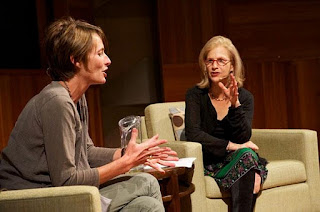Phedra Deonarine: What led you to your role as a curator for the ALOUD reading and conversation series at the Los Angeles Public Library?
And then there’s the element of luck. The Library Foundation of Los Angeles was looking for someone to create and produce public programs back in 1993, when the (rebuilt) Los Angeles Central Library reopened after a series of disastrous arson fires. I was in the right place at the right time; though in the beginning, I didn’t think I’d last six weeks.
That was eighteen years ago this fall and now we’ve presented over 1,000 free programs.
PD: How does you work as a writer relate to your work as a curator?
LS: My own work as a writer frequently explores memory and reconciliation. That interest is reflected in some of my choices for ALOUD. We recently hosted Leymah Gbowee, the Liberian peace activist. That same week she won the Nobel Peace Prize. Last week we presented Karl Marlantes, author of the great Vietnam war novel Matterhorn. His crucial new book is called What It is Like to Go to War. My own memoir, The Souvenir: A Daughter Discovers Her Father’s War, was an investigation into my father’s experience in the Pacific War and how it shaped our family life in Culver City, Calif., in the fifties. Marlantes writes about how we need “ceremony and counseling to help returning veterans move from the infinite back to the finite.” I’m concerned with the issues our returning vets now face. I’ve led writing workshops for veterans at the library. As Marlantes notes, by writing a story, one can take oneself by surprise, get past the usual defenses.
Reading is crucial to my life as a writer and also as a curator. My idea of heaven as a kid was to take a book and climb the neighbor’s Chinese elm and hang out there reading for hours. Reading is also part of my job. I’ll spend a day reading Alexandra Fuller before I interview her; or immerse myself in the work of poet Adam Zagajewski or Joan Didion before writing my introductions. It’s tonic for my own writing.
PD: The Web site for the ALOUD series offers a wealth of author podcasts. Which ones stand out for you and why?
 |
| A recent ALOUD program with Alexandra Fuller and Louise Steinman |
PD: What are you hoping for from the three short story collections that will be the finalists for The Story Prize?
LS: I love that feeling of being so deep in a story that you don't want it to end. I love when I enter a world that is familiar and yet strange. I love when I love a sentence or a paragraph so much I have to wake my husband up in the middle of the night and read it to him. I love when a story haunts me for days on end.
